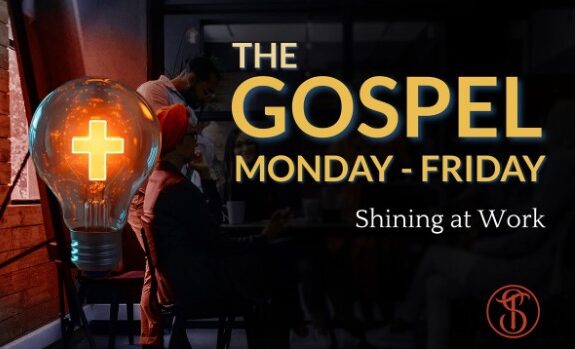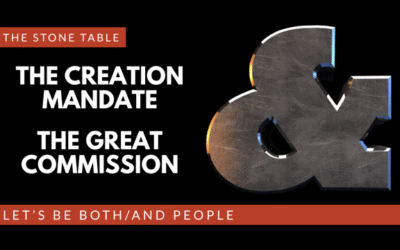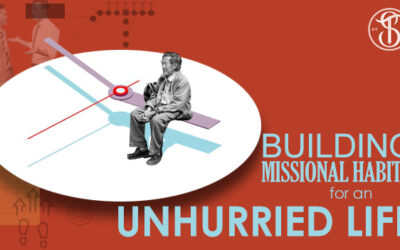<iframe width="560" height="315" src="https://www.youtube.com/embed/zYzDGyXLhj8?rel=0&showinfo=0" frameborder="0" allow="autoplay; encrypted-media" allowfullscreen></iframe>
The Gospel Monday: Shining Where You Work

I’m Not a Crook
I was twelve when I picked up All the President’s Men. Two reporters. A break-in at the Watergate Hotel. A secret source. The President of the United States on the other end of the trail.
I was hooked.
Maybe it was all those Scooby-Doo reruns. Or maybe I just liked the idea of pulling the mask off powerful people. Either way, I was convinced I was going to be an investigative reporter.
Fast forward: degree in hand, first job at the Cincinnati Enquirer. I walked in like it was my personal Pulitzer moment. And then I met my coworkers.
Jim, who welcomed me with language that made my Sunday school brain short-circuit. Janell, who told me mid-handshake she was an exotic dancer on weekends.
And there I was, young and eager, spinning in my chair wondering: what does it mean to be a witness here?
I knew I didn’t want to be the awkward Christian in the break room who made everyone hide when I walked in. But I also didn’t want to bury my faith under spreadsheets and deadlines. How do you shine without blinding people?
That’s the tension every Christian in the marketplace feels. You want to be faithful. You want to be bold. But you also need to keep your job, maintain respect, and actually be someone your coworkers want to grab lunch with.
The Theology
When Jesus said, “You are the light of the world. A city set on a hill cannot be hidden. Neither do people light a lamp and put it under a basket, but on a stand, and it gives light to all in the house” (Matthew 5:14–15), He was not addressing professionals in ministry. He was speaking to a hillside crowd of fishermen, farmers, tradespeople, mothers with children at their feet, and young disciples just learning what it meant to follow Him.
This was the Sermon on the Mount. Jesus had just pronounced blessing on the poor in spirit, the meek, the merciful, the persecuted. Then He looked at that unlikely crowd and said, “You are the light of the world.”
Not Rome with its armies. Not the Pharisees with their strict codes. Not Caesar with his claims of glory. You. Ordinary people who trusted Him.
For centuries, Israel had been called to be a light to the nations (Isaiah 42:6). But Israel often treated that calling as a privilege for themselves. Jesus reframed it: the light is not about status or position. It is about reflecting Him wherever you are.
Why did Jesus use this image of light right after the Beatitudes? Because He knew His followers would feel powerless with this message, the antithesis of what they had experienced.
But he guided their thinking and response with the metaphor…
A Light of the World — it is for everyone
Light shines on whoever is in its path. It does not discriminate or choose only the worthy. In a world without electricity, light meant life and safety. To be light meant to provide clarity and direction in darkness.
Tim Keller wrote, “The way to do Christian mission is to live a life so visibly different that people ask questions about it.” Light does not argue with the darkness. It simply shines.
A City on a Hill — it stands out
Ancient cities were often built on hillsides, visible for miles. At night the lamps would glow, and travelers could orient themselves by it. A city on a hill was impossible to ignore.
N.T. Wright explains, “When Jesus wanted to explain what the kingdom would look like, He did not give a theory. He told stories, and He lived in ways that embodied those stories.” The image of a city tells us that our lives are meant to be embodied stories, not hidden away in private spirituality.
In the workplace this means that if you follow Christ, people will notice. Your integrity, your peace under stress, your refusal to cut corners, your consistency when others cave in, these things will stand out. And though it feels risky to stand out, it is often how others find direction.
A Lamp on a Stand — it is close in proximity
In a first-century home a clay oil lamp, placed on a stand, could light the entire room. But only if it was in the room. A lamp under a basket was useless.
For us this means proximity is essential. You cannot be a witness if you remain withdrawn or aloof. You need to be near enough for others to see your light. Lunch tables, hallway conversations, coffee shop meetings, team chats, these are modern lampstands.
John Mark Comer warns, “Love, joy, and peace are incompatible with hurry.” If we are always too rushed or distracted, we cannot draw close to others in a way that allows the light to shine.
So what?
If we are the light, then our testimony is for everyone, even the people who drain us, hurt us, or overlook us. The office narcissist. The boss who never notices. The coworker who seems impossible to love. Light does not get to choose where it shines.
If we are a city on a hill, then our lives should stand out in the darkness. The way we handle pressure, disappointment, and success should feel different, countercultural even. And that difference is not manufactured; it flows out of intimacy with Christ.
And if we are a lamp on a stand, then proximity matters. Jesus ate with sinners and shared tables with tax collectors. He spoke with humility even to arrogant religious leaders (Luke 15). His message meant something because He was close enough for people to see and hear Him. The same is true for us.
What It Does Not Mean
Jesus does not say, “You are the Savior.” God alone saves.
He does not say, “You are the message.” We are only the messengers.
He does not ask us to manufacture light. He asks us to reflect it.
As Paul wrote, “I planted, Apollos watered, but God gave the growth” (1 Corinthians 3:6–7).
Miroslav Volf reminds us, “Work is not merely a way to make a living. It is a way of living in God’s creation in such a way that God’s purposes are advanced in the world.” You are not carrying the weight of saving your workplace. You are joining God in His work by reflecting His presence where you already are.
Everyday Ways to Shine
Being a witness at work does not mean forcing conversations or becoming the office preacher. It means reflecting Christ in ordinary, consistent, practical ways. Here are some places to start:
- Pray for your coworkers by name, not just in general.
- Write a handwritten note of encouragement when someone is struggling.
- Invite the coworker who always eats alone to lunch.
- Celebrate the wins of others instead of competing for attention.
- Speak calmly when others are losing their temper.
- Offer to help on a project without expecting credit.
- Say thank you often, especially to people who get overlooked.
- Show kindness to delivery drivers, janitors, and support staff.
- Forgive quickly instead of holding grudges.
- Refuse to participate in gossip, but do not shame those who do.
When you live this way, people will eventually start asking “why”.
- “Why do you give so much empathy to direct reports when they make mistakes?”
- “Why and how are you still happy when bids fall through like they did yesterday?”
- “Why are you at peace when the boss is screaming?”
- “Why are you patient with Kelly when she is clearly frustrating?”
- “Why are you kind to every delivery person who comes in the door?”
- “Why are you loyal and consistent when no one else in our department is?”
- “Why were you so gentle with Mike when you had every right to yell at him?”
- “Why did you practice so much self-control when customers were being unhinged?”
Go Be the Moon
We only know the moon exists because the sun shines on it. Without reflection it would be invisible, just a cold rock in the sky. In the same way, the only way the world will see Christ in us is if His light is shining on us and through us.
Your workplace is not an accident. It is your lampstand. God has placed you there on purpose, in that cubicle row, in that sales meeting, in that hospital wing, in that classroom. You are not there simply to make a living. You are there to reflect the life of Christ.
So go shine at work. Shine in the way you respond to pressure. Shine in how you treat the overlooked. Shine in how you forgive those who wound you. Shine in the courage to speak when the door opens. Let love and truth overflow naturally from a life rooted in intimacy with Jesus.
The heart of evangelism does not begin with clever words or polished strategies. It begins behind closed doors, on our knees, in communion with the Lord who is the source of the light. From that place we will not have to force it. Our coworkers will see it. They will ask why.
And when they ask, we will be ready with an answer. Not to point to ourselves. Not to prove our strength. But to point them to Him.

Bill Tibbetts
Bill Tibbetts is the Vice President of Education and Multiplication at The Stone Table, bringing over two decades of experience in higher education to his role. As the former Dean of the College of Business and Technology at North Central University, he developed a deep passion for mentoring, missions, and business consulting. Bill's extensive expertise uniquely positions him to lead initiatives that encourage marketplace believers and college students to actively engage with the Great Commission. He also serves on the board of the Community Reinvestment Foundation and is based in Minneapolis, MN, supporting The Stone Table's expansion into new regions.



